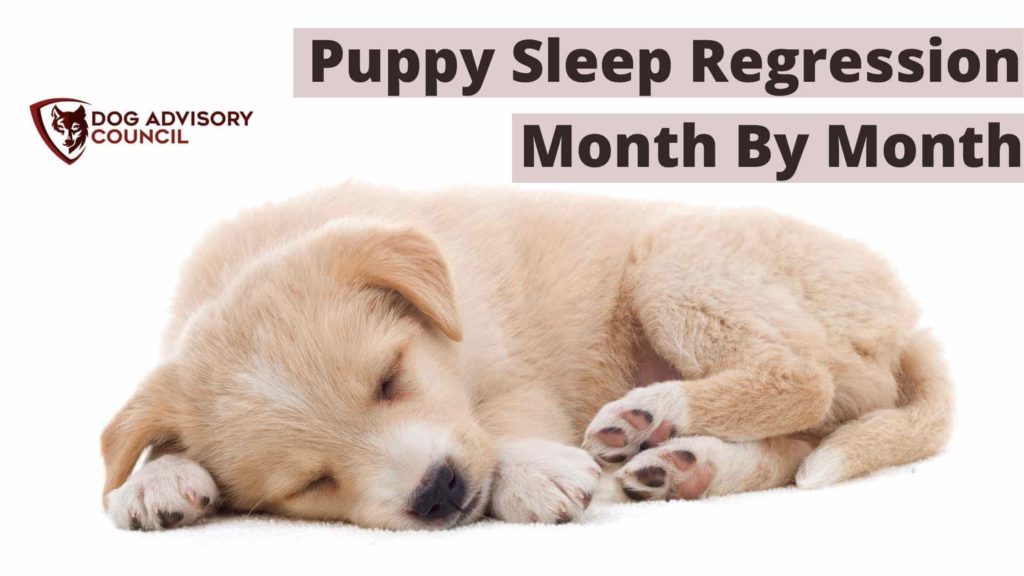
Have you suddenly noticed that your puppy appears to be sleeping less and wondering if it’s got something to do with their health? Yes and no! Here’s what you need to know about puppy sleep regression!
Puppy sleep regression is exactly what it sounds like! A period where your puppy suddenly stops sleeping and leaves you perplexed as to why! Some experience it through a lack of nighttime sleeping, and others notice it through seemingly sporadic and short sleep cycles throughout the day.
Some of the leading causes of puppy sleep regression include teething, outgrowing their sleeping space, or enjoying a strong bond with their human.
Get to the bottom of different types of sleep regression and what it means so that you can get everyone’s schedule back to normal sooner rather than later!
Is puppy sleep regression a thing?
As you might be able to guess, puppy sleep regression is a thing — a very real thing that impacts many puppy parents. Puppy sleep regression is very similar to what many parents experience with their babies and toddlers as they progress through the months.
Like with human babies, puppy sleep regression is understood as normal and, thankfully, temporary. Understanding its causes and how to address them will help you get everyone back to normal with as less stress as possible!
Puppy sleep regression has nothing to do with parenting style or puppy health. It’s simply part of the aging process, and pet parents can help them out with it a lot by offering them comfort and practical schedule changes to support them in growing and transitioning!
Unlimited claims, No credit checks, No upper age limit & Multiple pet discounts
Compare the best rates on pet insurance
Do puppies regress at 6 months?
Yes, it’s common for puppies to suddenly regress at 6 months of age or 3 months of age. These are typical milestones in a dog’s aging journey. We’ll get into the month-by-month expectations in a bit.
Puppies can have sleep regression at varying life stages. Both 3 and 6 months are typical ages for many pet parents to realize that their puppy has different sleep patterns than they had been previously.
Why has my puppy suddenly stopped sleeping properly?
Sleep regression has several causes, many of which are related to whatever ages they are at (more on that later). However, there are some general causes of sleep regression for both daytime regression and nighttime sleep habits:
- Diet
- Thirst
- Fear
- Boredom
Diet
Like any animal going through their early years, they’ll go through different growth spurts. As the body develops, their diet needs may change seemingly overnight. What was once okay for your puppy will suddenly be lacking, and they’ll need more.
Or, they could suddenly need more protein than they needed previously. Those things will cause your dog to sleep less as their body calls out for more of something in their amount or nutrient profile.
Thirst
If your dog is active and enjoying life, they’ll be more likely to deal with thirst issues. This includes simply feeling incessantly thirsty. This is why making sure that your dog has access to fresh water is always a good idea, even if they are in their crate. Dehydration can be serious in dogs, so it’s essential to keep this in mind.
Thirst can sometimes be a health concern, too, so make sure you always watch for other health concern signs.
Fear
Sometimes dogs will experience fear at different parts of their puppyhood stages. This can often show up in sleep regression because they’ll wake up in a panic, feeling fearful, and it can also mean that they have difficulty falling into a restful sleep for long periods.
This can be frustrating or sad for pet parents, but this is a temporary situation in their puppy’s growth pattern.
Boredom
Puppies have fast-developing bodies and needs, but their brains can be faster. This means they’ll need plenty of attention, toys, and social interaction! Even if those needs are met, some puppies might still be bored.
This can cause them to simply lie awake during the day or night, entirely bored. Just like kids, they need to be entertained almost constantly.
If your puppy is experiencing sleep regression, it’s normal to feel frustrated or at a loss. It’s important to remember that this isn’t something that your puppy can necessarily control, and blaming them for their “behavior” is only going to worsen their anxiety and can ruin the bond that they are still developing with you.

Causes for puppy sleep regression
As mentioned briefly above, there are some common causes for puppy sleep regression, which can be varied and more or less common depending on their age! Let’s look at some of the most common brackets and see just how popular some of them are within those.
8-12 weeks
Some, if not all, puppies go home within these weeks. As they get used to their new environment, family, and pets, this will lead to many moments of fear and uncertainty. This can lead to sleep regression.
They will also go through a growth spurt during this time, which can be uncomfortable for their physical body, leading to difficulty sleeping. They may also feel uncomfortable in their bed or crate as they grow, which can worsen the problem.
4-6 months
When they are anywhere between these ages, they’ll be growing quickly. This growth spurt, as mentioned, can cause them some difficulty sleeping as they grow into their body. Teething can further complicate this as far as physical pain is concerned. They will also become very attached to you as their family. This means they won’t want to be away from you, even if it’s just to sleep!
7-18 months
In this stage, they’ll have more growth spurts, which can cause them to lose sleep as they struggle with this discomfort. They also will quickly outgrow their crate or bed, which can lead to even more physical discomfort when sleeping!
Below, we’ll go into more detail on how to address each one and understand why or how it causes sleep regression.
How do I get my puppy to sleep back at night?
No matter how patient you are, having your puppy up at all hours will be frustrating and upsetting for both of you. Getting your puppy over their sleep regression will be about understanding the probable cause and then solving it. After that, most of it will be about keeping your puppy on a schedule and sticking to it. We’ll go into that more in detail later, too!
How long should a 3 month old puppy sleep at night?
If your puppy is 3 months old, you can expect them to sleep 18 to 22 hours. More than likely, a lot of that will be at nighttime. Most puppies don’t consistently start sleeping through the night until they are about 4 months old.
Do puppies regress at 1 year?
Typically, you can stop worrying about pay sleep regression once your puppy turns 1. However, a schedule will be a huge part of helping them keep their sleeping schedule focused. That’s why a schedule will be such a critical gesture for your puppy’s needs and expectations.
How many hours should a 6 month old puppy sleep?
Once your puppy reaches the age of 6 months, they should be sleeping between 14 and 18 hours. As your puppy ages up, this amount will lower naturally, dropping down to the lower amounts as the actual month age gets older. This is just part of the aging process, and it’s a sign that your puppy is healthy and happy.
What are puppy dog sleep patterns?
If you’re here because you’re just trying to get a sense of what you can expect from your puppy as they reach different milestones, let’s start from the beginning and understand the need for sleep, how it changes, and why it may seem to be going back and forth.
Newborn puppies will sleep whenever they aren’t nursing. They nurse every 2 hours during these critical first days and weeks of life, so that’s a lot of sleep! This is what their body does to grow and develop healthily.
Puppies between 2 and 5 months of age will sleep around 18 and 22 hours per day/night. They still have a lot of growth and development, so they need to sleep enough to rest up between play and cuddle sessions!
When puppies reach the age of 4 months old, they can start to sleep through the night on their own. This is when many will match their sleeping schedule with that of their owners. They’ll still be sleeping between 18 and 22 hours, but most will notice that this may start creeping back towards the end of the month.
Between ages 6 and 12 months, the hours for sleep will be somewhere between 14 and 18 hours per day. Most will notice their dogs sleeping for 6 to 9-hour stretches at a time. This is normal for most adult dogs and is healthy. While they sleep more than humans, this amount of sleep is considered healthy for a dog.
Adult dog sleep patterns
Once your dogs are over 1 year old (and considered an adult), they’ll sleep between 12 and 16 hours. This is considered normal and healthy for an adult dog. They still need a lot of sleep compared to humans, but they often align their sleep when humans are asleep or at work/not home.
Senior dog sleep patterns
Senior dogs will often sleep more than classic adult dogs, as will dogs who are sick or dealing with illness. Many will sleep 18 hours a day or more as they age or get sicker.

Puppy regression month by month
So, if your puppy is supposed to be sleeping a certain amount, why are they suddenly interrupting their own schedule and health needs with sleep regression? It’s all about taking it apart month by month and understanding what’s happening in that specific period for your puppy’s development.
Between 6 and 10 months old, certain things happen within your puppy that impact the approximate 14 to 18 hours of sleep they should be getting!
6 months
When your puppy is 6 months old, they bond with their family and those around them. This means that sleep regression is commonly caused because they want attention! They don’t want to be apart from anyone, even long enough to grab some sleep.
7 months
Your pup will be going through a growth spurt right around this time. This means that they might even start outgrowing their crate or bed. This inability to get comfortable in their sleeping situation can make them regress in their sleep patterns.
8 months
When your puppy is 8 months old, their body is developing so fast, and something changes every day. One of the biggest changes at 8 months old is that their teeth will start to change over, leaving to the inevitable teething pain and frustration. This can lead to sleep regression, amongst other things.
Another reason for sleep regression at 8 months could be boredom. Since their brains are still developing, they constantly need stimulation and will otherwise be bored no matter how much they’ve played with toys all day long.
9 months
At this point, your dog is old enough to be put on a schedule. So, learning when are the times for mealtime, playtime, exercise time, and sleep time can help them understand what’s expected and when. If they don’t get a schedule at this point, sleep regression can set in and leave them confused about when they should sleep.
10 months
Your puppy’s brain is still developing throughout the months, but 10 months is often when it takes another “growth spurt.” This can lead to boredom since their brains will always feel like they constantly need to be focused on something.
How to reset a dog’s sleeping pattern?
Ideas and reasons aside, you want to make sure that you get your dog’s sleep schedule back on track as much as possible as fast as possible, right? Here are some general tips that will help your puppy or dog no matter what stage they are at:
- Consistent schedule
- Exercise
- Dedicated sleeping area
- Changing meal times or limiting food
Consistent schedule
Keep your puppy or dog on as strict a schedule as possible! From mealtimes to sleep time and exercise, a strict schedule is your best friend for getting to the bottom of the sleep regression problem. The more they understand how to do something when it helps regulate their sleeping needs around it.
Exercise
Keeping your dog moving as much as possible will help them feel tired when they should, as much as they should. This isn’t just physical exercise needs, though, but mental exercise through toys, puzzle mats, etc. Mental stimulation will exhaust them and allow them to sleep comfortably.
Dedicated sleeping area
If they have a dedicated sleeping area that is just for them (such as their crate in a quiet area of the home), they’ll be more likely to go there to sleep when tired and stay asleep. If they don’t have a dedicated sleeping area, they might be confused about when to sleep and even where, leading to sleep regression.
Changing meal times or limiting food
A dog with a full stomach can sleep well, but if they don’t have enough time to digest their food before they sleep, it can lead to a restless sleep as their stomach works. Try to limit their heavy, full meals to at least a few hours before bedtime.
How to help my dog sleep all night
If you want to do whatever you can to help your dog sleep at night to match your sleep schedule as much as possible, here are some tips to help you give them the best chance at arranging their sleep schedule to yours!
- Keep their crate dark with a sheet
- Add some white noise to the crate or sleeping area
- Give them lots of comfortable blankest and stuffed animals for comfort
- Take them on a car ride
- Offer calming treats to CBD oil
- Take them on a walk or play before bed
The more relaxed your dog is, the easier it will be for them to fight the natural sleep regression and sleep through the night. This means less sleep time wasted for you and a stronger chance of enjoying restful and restorative sleep for your dog, too.
In general
Puppy sleep regression is a common part of aging, particularly at 3 months and 6 months. This is when a puppy’s natural sleeping schedule gets interrupted, and they’ll be up at all hours, often unable to sleep. Common causes can be teething, outgrowing their space to sleep, such as a bed or crate, feeling fearful with separation anxiety, or even boredom!
Sleep regression is a frustrating thing, but the good news is that it is temporary and can be solved. The key is just to make sure that you understand what it is, how to address it, and always focus on the idea that it is just part of puppyhood!
Understand how to help curb sleep regression and get your puppy’s development and sleep schedule (as well as your own) back on track!
Know someone struggling with this right now? Share this with them and help them get through it!
Unlimited claims, No credit checks, No upper age limit & Multiple pet discounts
